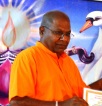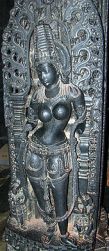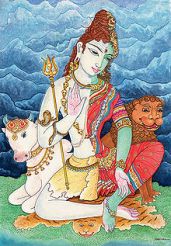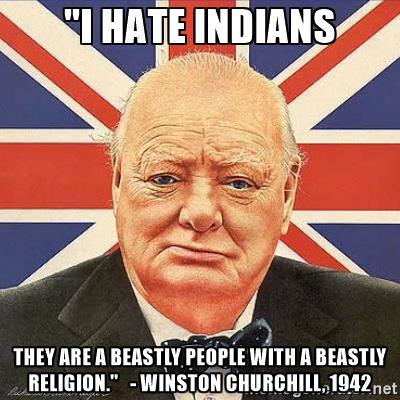 “[Many Hindus] claim that having a liberal and enlightened attitude towards homosexuality means that we are giving in to Western influence and values. It is always intriguing when we hear uninformed people speak of homosexuality as a form of colonialism. Aren’t they aware of the apparent contradictions? Of all the institutions we have inherited from the colonial past, there is none more thoroughly colonial and Western, heart and soul, than Christianity—a religion whose scriptures are often invoked when vilifying homosexuals.” – Swami Aksharananda
“[Many Hindus] claim that having a liberal and enlightened attitude towards homosexuality means that we are giving in to Western influence and values. It is always intriguing when we hear uninformed people speak of homosexuality as a form of colonialism. Aren’t they aware of the apparent contradictions? Of all the institutions we have inherited from the colonial past, there is none more thoroughly colonial and Western, heart and soul, than Christianity—a religion whose scriptures are often invoked when vilifying homosexuals.” – Swami Aksharananda
 When Guyana’s inter-religious organisation issued a statement denouncing homosexuality, the central argument was that unseen parties want to influence and corrupt young impressionable minds to promote homosexuality. The statement instructed us that the scriptures of all religions condemn homosexuality, as against the “natural law,” violating the natural plan of creation, that will lead to the damnation of our nation and to our extinction.
When Guyana’s inter-religious organisation issued a statement denouncing homosexuality, the central argument was that unseen parties want to influence and corrupt young impressionable minds to promote homosexuality. The statement instructed us that the scriptures of all religions condemn homosexuality, as against the “natural law,” violating the natural plan of creation, that will lead to the damnation of our nation and to our extinction.
The most extraordinary claim, however, is that homosexuality is a product of Western culture, a new form of colonialism.
This statement reflects a host of irrational fears that cannot be empirically supported by social reality anywhere in the world. People are not converted to homosexuality in the manner of religious proselytizers who, through unconscionable and despicable methods, unapologetically and deliberately target young and impressionable minds and prey on people’s vulnerability.
Of all societies in the world where homosexuality is accepted as an alternative lifestyle, none has suffered the kind of the degradation that our religious leaders fear may take place here in Guyana. The Netherlands, for example, and particularly the Dutch city of Amsterdam, is perhaps one of the most liberal places in the world. The city even boasts a monument devoted to the memory of homosexuals who have been persecuted throughout the ages. There can be few places in the world that breathe such an air of freedom, sophistication and culture, music, art and literature, much of it contributed by homosexuals themselves, as Amsterdam.
 From Finland to Italy and across the Atlantic to United States and Canada, liberal, compassionate and enlightened attitudes towards diversity and alternative lifestyles are an integral part of peaceful, progressive, humane societies. In these nations, the family continues to prosper. There are no signs of “extinction” and “damnation.”
From Finland to Italy and across the Atlantic to United States and Canada, liberal, compassionate and enlightened attitudes towards diversity and alternative lifestyles are an integral part of peaceful, progressive, humane societies. In these nations, the family continues to prosper. There are no signs of “extinction” and “damnation.”
Such fears derive not from homosexuality, but from irrationality and fanatic religious zealots of every stripe and star, from those religious persuasions which claim to be the sole repository of the truth to which all else must be converted, and from followers of such religions who do not have the patience to wait for unbelievers and homosexuals to be punished in the afterlife, as their teachings go, but who with awesome zeal seek to do so here and now.
So, who or what poses the greatest dangers to society? Is it homosexuality, or is it religious intolerance? The clear and unambiguous truth is that the greatest danger lies among those aggressive, intolerant religious creeds of the world that see unbelievers and those whom they believe violate the “natural law” as agents of the devil and enemies of God.
We must guard against the self-appointed arbiters of morality, the moral policemen, who claim to derive their authority and inspiration from ancient and divine writs that, implicitly and explicitly, leave no room for toleration of religious differences—or other diversities such as sexual orientation.
 This brings us to the claim that having a liberal and enlightened attitude towards homosexuality means that we are giving in to Western influence and values. It is always intriguing when we hear uninformed people speak of homosexuality as a form of colonialism. Aren’t they aware of the apparent contradictions? Of all the institutions we have inherited from the colonial past, there is none more thoroughly colonial and Western, heart and soul, than Christianity—a religion whose scriptures are often invoked when vilifying homosexuals.
This brings us to the claim that having a liberal and enlightened attitude towards homosexuality means that we are giving in to Western influence and values. It is always intriguing when we hear uninformed people speak of homosexuality as a form of colonialism. Aren’t they aware of the apparent contradictions? Of all the institutions we have inherited from the colonial past, there is none more thoroughly colonial and Western, heart and soul, than Christianity—a religion whose scriptures are often invoked when vilifying homosexuals.
The fact of the matter is that homosexuality is as old as humanity itself. It has been practiced for untold centuries, in one form or another, even in those societies where, today, death can be the penalty for homosexuals.
 We must also be concerned about what is glibly and uncritically invoked to be the position of scriptures on homosexuality. There is hardly any consensus here. While it is true that some religious books consider homosexuality an abomination, Hinduism, for example, offers a much more nuanced and sophisticated perspective on the matter. While Hinduism does not approve of homosexuality, it admits of a wide range of sexual orientation possibilities; therefore, the vehemence and stridency of loud anti-homosexual sentiments cannot be shared by Hindus.
We must also be concerned about what is glibly and uncritically invoked to be the position of scriptures on homosexuality. There is hardly any consensus here. While it is true that some religious books consider homosexuality an abomination, Hinduism, for example, offers a much more nuanced and sophisticated perspective on the matter. While Hinduism does not approve of homosexuality, it admits of a wide range of sexual orientation possibilities; therefore, the vehemence and stridency of loud anti-homosexual sentiments cannot be shared by Hindus.
Rationality is all I am advocating. Religious people often decide which things are right and wrong based on what they believe and imagine to be true, which in turn is based on what is stated in their religious texts. How does one know whether a religious scripture is right? The answer is that it is the inviolable, unalterable word of God. And, how does one know that it is the word of God? The only answer is because God says so. Quite an eternal conundrum!
When held beyond the scrutiny of reason, no religious scripture, no matter how sacred we hold it to be, can ever be a safe ground on which to decide important issues that may have implications in matters of life and death.
» Swami Aksharananda, Ph.D. in Hindu Studies at the University of Wisconsin-Madison (USA), is principal of the Saraswati Vidya Niketan. He is also a founder of Guyana’s Hindu Swayamsevak Sangh chapter.
See also
- Hinduism and homosexuality through the ages – Bharat Gupt
- The origins of “sodomy” laws in British colonialism – HRW
- A Hindu approach to LGBT rights – S. Venkataraman & H. Voruganti
- Can Hinduism and homosexuality coexist? – Nathan McDermott
- Homosexuality and Hinduism – Ruth Vanita
- Section 377: A Hindu view of alternative sexuality – Sandhya Jain
- Homosexuality in India: A literary history – Nilanjana S. Roy
- Homosexuality in India, where tradition still rules – Chinmayee Manjunath
- Is homophobia in India an alien legacy of the Victorians? – Man of Roma
- Prince’s secret tears royal family apart, shocks his nation – Elizabeth Joseph & Michelle Smawley
- “Hindu religion is the only religion in the world that has traditionally given due respect to hijras and transgenders,” says Baba Ramdev
Filed under: india | Tagged: gay, hinduism, homosexuality, lesbian, third gender |


























LikeLike
LikeLike
Section 377: Dump the obsolete colonial law – Anand Grover — 31 July 2017
With the German Bundestag voting to legalise gay marriage, the question has naturally arisen: “What is India doing about Section 377?” This section of the Indian Penal Code (IPC) criminalises penetrative penile-non vaginal sexual acts.
After the great victory in the Delhi High Court in the Naz case, the LGBTI (Lesbian Gay Bisexual Transgender Intersex) communities had to face defeat in the Supreme Court in the Koushal case. The review petitions against it were dismissed. Fortunately, in the curative petitions filed after that, the Supreme Court has directed that a constitutional bench will hear them. When they will be heard is anybody’s guess. However, the curative petitions are a window of opportunity for the LGBTI communities. The question is still wide open as far as the Supreme Court is concerned.
Koushal obviously had negative repercussions. Community activists went through a period of demoralisation. Cases of blackmail and extortion have spiked and access to justice thwarted. The defeat in Koushal has, however, not killed the spirit of the LGBTI community in India. While everyone thought that gay persons would return to the closet, it simply has not happened. Those who are out have stayed out. To be sure, the new younger crop of LGBTI persons find the environment more constricting than the one that operated from Naz to Koushal. But, one sees many more, younger, people eager to take up the baton for the rights of the LGBTI communities. This is a big victory in itself. The media is also fully on board. Finally, I would submit that the vast majority of ordinary people are also with us. Yes, the bill of Shashi Tharoor, the Congress MP in the Lok Sabha, to delete Section 377 from Indian law was stymied. The BJP MPs organised to ensure its defeat. So the Parliament route is closed for the moment. It is arguable whether Tharoor had mobilised enough support to put the Bill to the House.
Where does it leave the LGBTI movement on Section 377? While the developed world has made very quick strides from decriminalising gay relationships to legalising gay marriages, India is still stuck with whether to get rid of Section 377.
The communities have to continue their advocacy at all levels, at the central and the state levels. Even though BJP MPs were instrumental in defeating Tharoor’s bill, one has to still engage with them. My understanding is that there are strong voices within the BJP who favour deletion of Section 377. So the effort for advocacy at the legislative level must be ongoing. In this respect, a window of opportunity has been provided with the National Legal Services Authority (NALSA) judgement on transgender rights. Firstly, it has allowed an opportunity for debate amongst legislators in Parliament on the issue of transgender rights, which is intimately connected with 377.
Secondly, the spirit and the logic of the NALSA judgement are completely antithetical to the Koushal judgement. At the time of the final hearing of the curative petitions, this will give ammunition to the lawyers of the LGBTI communities. Now is the time not to give in to despondency and lose hope. Now is the time to regain one’s strength and regroup. In the quietus that exists today, work has to be done systematically to change the thinking of society. Debates should continue at the community level on how to achieve this so that the onward march of liberation from the yoke of colonialism in the form of 377 is overthrown once and for all. Sooner or later, this wall will fall. It is only a matter of time. – Sunday Chronicle, 30 July 2017
» Anand Grover is a senior lawyer and human rights activist known for his legal activism in Indian law relating to homosexuality and HIV. He is also one of the founder-members of the Lawyers Collective.
LikeLike
It is the business of lawmakers (government) to make, amend, and reform laws and the business of courts to uphold the laws made by lawmakers.
It is the Modi government’s responsibility to throw out Article 377, not the Supreme Court’s.
Jaitley is trying to shift responsibility from the government to the court because the NDA Modi government doesn’t want to touch Article 377 fearing a backlash from Muslims, Christians, and those Hindus who have internalised Victorian British mores and think they are Hindu mores.
LikeLike
SC must review Sec 377 ruling, allow gay relationships: Jaitley, Chidambaram – The Times of India – Amit Anand Choudhary – TNN – Nov 29, 2015
NEW DELHI: Two top leaders of BJP and Congress on Saturday came out in support of gay rights, saying that the Supreme Court must reconsider its decision upholding Section 377 of the Indian Penal Code.
Speaking at the Times LitFest, finance minister Arun Jaitley and his predecessor P Chidambaram said the Supreme Court should not have reversed the Delhi high court order de-criminalizing consensual sex among gay adults. Jaitley said the SC’s view was not in sync with the jurisprudential development on gay rights world over and added that the apex court must review its 2013 judgment to do away with the penal provision in Section 377 as far as gay relationships are concerned.
“When millions of people world over are having alternative sexual preferences, it is too late in the day to propound a view that they should be jailed. The Delhi High Court’s view appears more acceptable,” he said.
Jaitley is the first leader from the government to have supported de-criminalization of consensual sex among gay adults. Although he was speaking in his individual capacity, his comments may revive the debate on an issue which many right-wingers consider to be a taboo.
Speaking just afterwards, Chidambaram ,who was also speaking in his personal capacity, said that the Delhi High Court verdict decriminalizing gay sex was a wonderful one and the Supreme Court should have stayed with it.
The finance minister was also critical of the SC’s judgment scrapping the National Judicial Appointments Commission (NJAC). He said this judgment too needed to be reconsidered. “This judgment meant that the CJI would virtually appoint judges and that elected representatives were not to be trusted on this issue. It’s not a fair argument as elected bodies are basic part of the Constitution. The judgment needs reconsideration.”
The Delhi High Court’s 2009 judgment decriminalizing Section 377 to stop police harassment of adults of same sex having consensual sexual relationship in private was challenged in the SC by religious bodies. Shutting the small window for gay rights opened by the HC, the SC had in 2013 held that Section 377 providing punishment for gay sex was constitutionally valid.
The SC had in 2014 rejected petitions seeking review of its 2013 judgment. However, there still is a last theoretical chance for the SC to reconsider its 2013 judgment when it takes up curative petitions pointing out glaring legal infirmities in the verdict.
LikeLike
Our party position is homosexuality is a genetic disorder, says Subramanian Swamy – DNA – New Delhi – 30 June 2015
BJP leader Subramanian Swamy on Tuesday waded into a fresh controversy when he stated that the BJP’s position on homosexuality was that it was a genetic disorder.
Swamy was responding to a question about Law Minister Sadananda Gowda’s statement. Gowda was reported to have said that the government was considering scrapping Section 377.
Meanwhile, Union Law Minister Sadananda Gowda said that he has been misquoted with regards to his statement on IPC Section 377 and added that he never mentioned the scrapping of the same.
“It is totally misquoted. When I was asked about the judgment that was given by the US court, I said that it is not an easy task in our country. So, the people of that country might have accepted it but here it has to be widely debated. Only then can something be done. Otherwise, it is not an easy task. So, we have no idea of scrapping or doing anything about [Section] 377,” Gowda told ANI.
“Of course, there was a debate with regards to the transgender issue on the floor of the House in the Rajya Sabha. That has been discussed and debated. Nothing else was said,” he added.
According to reports, Gowda had earlier indicated that India could move towards abolishing Section 377 of the Indian Penal Code, which criminalises ‘unnatural sex’, paving way for the recognition of homosexual rights in the country.
LikeLike
Maybe an important question here is: what is Brahmacarya? I am not in a position to give an answer for others. Only a small thought: in meditation i found it helpful to think of Brahmacarya as an advice to avoid hedonistic excesses. It is often quoted it would mean to live in chastity, primarily sexual chastity. Maybe this is true for some people. For me it is more important to live in modesty, refraining from addictions and egomania. Why should homosexual oriented people (men and women) not be able to live in such a way? Whether their partners are male or female – does it really matter for such questions?
LikeLike
true
LikeLike
Hinduism used to be the most open minded religion. Nowadays what has been propagated by VHP and Baba Ramdev like self-proclaimed saints is totally so not a part of Hindu religion. Hinduism is the only religion who accepts women also as their God and welcomes sexuality with open arms. That is why there was peace and harmony in ancient India not chaos like today’s India. It is high time when people should know what Hinduism actually was about and open their eyes.
LikeLiked by 1 person
Is it Hindu to be homophobic? – Devdutt Pattanaik – Times of India – Dec 15, 2013
Following the Supreme Court judgment upholding IPC Section 377, I was invited by a few regional TV channels to speak on the issue of homosexuality and Hinduism. I was deemed an expert as I have written many books on Hindu mythology, including retellings of Mahabharata and Ramayana.
In most places, I encountered something very peculiar: it was assumed I would welcome the Supreme Court judgment and condemn homosexuality as unacceptable in Hinduism. They were quite surprised (many pleasantly) when I did not do so.
That got me thinking: why is it assumed that Hindus, by default, would condemn homosexuality? Is it because of Baba Ramdev’s caustic rant? Didn’t they see Sri Sri Ravishankar’s tweet saying homosexuality is not a crime in Hindu culture?
The problem is not so much with Hinduism as it is with the popular understanding of religion. Religion is seen as anti-sex. Sex is seen as a diversion and distraction from the spiritual path. The Bible tells tales of men like Samson losing divine power when they fall for the sensual charms of women like Delilah. Buddhism visualizes Gautama overpowering the daughters of Mara, demon of desire, in his quest for enlightenment. Puranas inform us of how Shiva opens his third eye to set aflame Kama, god of sensuality. Celibacy has traditionally been associated with holiness. Sex is permitted only within the confines of marriage. Sex for pleasure is seen as dirty, anti-social, even evil.
So it follows that sex that has no procreative aspect, sex that can only be for pleasure, such as that between two men or two women, or with someone who is intersex or transgender, and sex that does not involve reproductive organs, must be bad, anti-spiritual, anti-religious, the work of the Devil. The British reinforced this view by creating the ‘sodomy’ law, referring to the biblical city of Sodom that was destroyed by God as it was rife with sexual deviations. Subjects of the British empire, Hindus included, were keen to distance themselves from all such things vile; they were determined to prove themselves pure, even if it meant wiping out or denying their own legacy.
But Hinduism had a peculiar problem. Most religions implement themselves through rules. But not Hinduism. Rules in Hinduism are always restricted to a particular community (sampradaya) and there are thousands of such sampradayas. There is no pan-Hindu rule. What binds it then? To understand this we have to appreciate two aspects of Hinduism: shruti and smriti.
Shruti refers to cosmic vibrations of eternal ideas heard by sensitive open minds. Smriti refers to rules springing from human memory that takes into consideration needs of desha (land), kala (time) and guna (personality of people). Rules are supposed to be contextual, responding to history and geography and communities. When smriti becomes rigid (caste laws, for example ) society stagnates and stinks. Shruti allows Hindus to redefine and relook at smriti that has outlived its utility, change it to suit changing times, so that it brings happiness to all.
Happiness whether it is sukha (joy), shanti (peace) or samruddhi (prosperity) then can be seen as the goal of Hinduism. How do we get it? It is here that Hinduism distinguishes itself from most religions. It does not give a single answer.
Just as different plants find nourishment differently, just as every animal seeks its own kind of food, every human walks his or her unique path, sometimes seeking guidance of a guru. Since everyone has unique physical, emotional and intellectual capabilities, nothing can really be standardized for humans, not even the idea of God. So, in Hinduism, God is both outside and inside, formless (nirguna) and of myriad different forms (saguna): mineral, plant, celestial body, animal, half-animal, half-human, male, female, even half-female. Diversity is thus embedded. Subjectivity is thus celebrated. And all attempts to confine it with rules is resisted.
This fluid architecture is what enabled Hinduism to stay relevant throughout its 4,000-year history. Fluidity means wisdom needs to be valued over judgment, inclusion over exclusion, affection over righteousness, love over rules. This means there can be no room for homophobia in Hinduism, much to the irritation of those Hindus who desperately want rules to control even the private bedroom habits of consenting adults.
>> Devdutt Pattanaik writes on mythology. His blog is here.
LikeLike
Dalai Lama supports gay marriage – The Telegraph – London – 7 March 2014
The celibate Dalai Lama has thrown his considerable moral weight behind gay marriage, condemning homophobia and saying sex was fine as long as it was consensual.
The Buddhist monk offered his views on the hot-button social issue during his latest tour of the United States, where he was welcomed on Thursday in Washington by top politicians and offered the customary prayer that opens each Senate session.
The Dalai Lama, in an interview, said that gay marriage was up to each government and was ultimately “individual business”.
“If two people – a couple – really feel that way is more practical, more sort of satisfaction, both sides fully agree, then OK,” he told an online talk show by veteran radio and television host Larry King.
The Dalai Lama said though that people should still follow their own religions’ rules on sexuality.
“But then for a non-believer, that is up to them. So there are different forms of sex – so long (as it is) safe, OK, and (if both people) fully agree, OK,” the Dalai Lama said in English.
“Bully, abuse – that’s totally wrong. That’s a violation of human rights,” he said.
The Dalai Lama is Tibet’s exiled spiritual leader and one of the most prominent leaders in Buddhism.
Gay marriage has won growing acceptance in the Western world and Latin America. But no predominantly Buddhist nation allows gay marriage, although several places with Buddhist influence including Nepal, Taiwan and Vietnam have increasingly debated the issue.
The Dalai Lama, who fled his Chinese-ruled homeland for India in 1959 and later won the Nobel Peace Prize, has prided himself on progressive positions and described himself as a feminist.
But his past comments on gay rights have occasionally bothered some of his Western audiences. In one of his books, the Dalai Lama, while not explicitly criticising homosexuality, said that sex should only involve “organs intended for sexual intercourse”.
LikeLike
References to homosexuality and a third gender are given in Sandhya Jain’s article at http://wp.me/pEi6D-fXG and Ruth Vanita’s article at http://wp.me/pEi6D-fWa.
Hijras and homosexuals have always had a presence in Sanskrit literature and Hindu society.
Overall, Hindu society neither condones or condemns homosexuality.
LikeLike
“While Hinduism does not approve of homosexuality, it admits of a wide range of sexual orientation possibilities; therefore, the vehemence and stridency of loud anti-homosexual sentiments cannot be shared by Hindus”
False. Give evidence quoting from the Vedas, Upanishads and Bhagwat Gita that Hinduism is liberal towards Homosexuality.
.
LikeLike
xxx
Erotic sculpture in Khajuraho, MP
Homosexuality in Ancient India – Uday India – November 2013
Prof Bharat Gupt, a classicist and dharmashastra scholar held a talk at Delhi’s Habitat Centre on November 25 on “Hindu View of Homosexuality”. He examined the issue along with a fellow speaker and discussant Dr. Come Carpentier of France. He observed that talking about the Rights of the Homosexual/Gay individuals seems to be one of the major agendas of social reforms in India today. Many people think that ancient Hindu ideas were entirely compatible with the views of modern European and American notions.
Therefore, it was imperative that one goes to see the classical texts to collect evidence on the status and life of homoerotic individuals in ancient India. One hears all the time, he said, the usual sentiment that as Hinduism is a very tolerant culture, that it was totally open to homosexuality and that it was more modern than the moderns. Many people argue, like the scholars of the Hare Krishna order, that as Hinduism believes that every human being is part of Supreme Being Brahma, homosexuals cannot be considered as beings of lower category. They also think, with out any evidence, that in the Vedic age, homosexuals were fully integrated into social and monastic orders. Prof Gupt said that most of these sentiments are uninformed.
Talking about the textual evidence, Prof Gupt mentioned that the Kamasutra of Vatsyayana, does define a third order of humans called the tritiiyaa prakriti or third nature. This third nature persons are of two kinds, one of the female kind and the other of the male sort (dvividhaa tritiityaaprkritih, striiruupinii purusharuupinii ca 2.9.1). Vatsyayana goes on to say that “she”, who behaves like a woman, is to be employed for oral sex (tasyaa vadane jaganakarma tadauparisht. akamm aachakshate 2.9.3). She was a paid sex-worker like a courtesan (vaishyaavat charitam prakaashayet 2.9.5) . For the male kind who has the desire for males but who cannot make his nature very evident, ‘he’ should take to the profession of massage-giver and thus coming into contact with males satisfy them through oral sex (2.9.6-10). In this context, the act of auparishtaka is described in detail in the Kamasutra.
The ancient Hindu society, as is evident here, did not consider the homosexuals as perverts or sinners. As the term, tritiiya-prakriti or third nature describes them, they are being themselves, they are being natural. This is the primary difference between the Christian and the Hindu attitude. Christianity did not accept the third nature and hence imposed a punishment on their activities.
For the Hindu social order the homoerotic were not expected to follow the heterosexual norms of behaviour. So they cannot be blamed for being what they are. And for this reason, accepting their nature, they were not excommunicated or purged from human societies. They had to be given a place in it and they were to be protected and prevented from harm by the State. The Arthashastra prescribes a fine for those who persecuted a homoerotic person (3.18.4) and it does not prohibits making of eunuchs even in the conquered population by a king by castrating captured males of the vanquished (13.5.13). Thus Hindu society accepted the third nature of persons who were born with it and did not want to replicate them for any purpose of social engineering. Prof Gupt said that Christians promoted homosexuals to practice religious castration and Muslims profusely castrated the vanquished populations to create classes of menial and warrior slaves. Dr. Come Carpentier pointed out that modern corporations want to promote homoeroticism as homosexuals bereft of the burden of families, are great consumerists and hence great customers.
While accepting the third nature persons, the ancient Hindus gave them a special place in the social order. They were designated to be part of the class of sex-workers and performers of music and dance. As till around the 10th century, prostitution was a legal profession, taxed and protected by the State and enshrined as duty of the king in the dharmashastra texts. The homoerotics, as part of the class of courtesans, musicians, dancers and performers, had the legal protection and their incomes and their sustenance ensured. This position was certainly not respectable and was disadvantaged, as it was of a lower category. In fact, it was out of the varna order or varnabaahya. But they also had the freedom/advantage of not having any obligations of adopting / raising any children or performing the rituals for ancestor worship which was a major obligation for the varna Hindus. Difficult for us to imagine today, it was a free life in a major way.
Prof Gupt pointed out that ancient Hindu society envisaged marriage as primarily devoted to procreation and raising of able and educated individuals who would contribute to society by performing duties to living and the ancestors. While pleasure (rati) was one aspect of sexuality, dharma (obligations) and artha (commerce) and moksha (liberation) were the other three. As the kinnars were not capable of doing obligations they were made into a special class and given a jati or guild. It may also be pointed out that many homoerotics, impotents or sperm-count deficient persons continued to be part of usual varnas and jatis. Ways were found to provide them heirs, one method being niyoga.
Coming to the present day situation, Prof Gupt said that historical developments have jumbled up the ancient solution. The Islamic intervention in the medieval period altered the status and social acceptability of the homoerotic class. The performing arts of theatre and dance were now taboo in urban life and prostitution lost its legal and respectable status though still preserving itself as a repository of music and dance. However, homoerotics had a much greater employment in harems of Sultans and Rajas and a connection with espionage as of yore.
It is the British who delivered the stroke of grace for the homoerotics. The Biblical and Christian prejudice against sodomy turned the kinnars of India into criminals. It delegitimised the profession they had earlier and prevented them from taking to a new one. As Indians have been too slow to alter the Criminal Procedure Code, the section stating punishment for homoerotic contact has not been still eliminated from Indian law. It should be soon done away with the traditional freedom restored. But the dismemberment of these people from social order created by the British cannot be restored so easily. It would take some serious research to find out what are they now tending towards as professions. At a cursory glance one may say they are to be found a lot in fashion and film industry.
Prof Gupt, then commented upon the contentious issue seizing the arena of debate, whether gay marriage should be legalised or not. He expressed his candid opinion that while gay cohabitation should not be illegal, persecuted or even frowned upon, giving the same rights to gay cohabiters as to the married heterosexuals couples is not advisable. Some difference between gay partnership and heterosexual marriage is necessary. He argued that children adopted by gays are very likely going to acquire a gay syndrome. This is going to be unhealthy for the institution of family which is already under many threats and is almost on the verge of extinction in Europe and America.
Dr. Come Carpentier made the most revealing suggestion that Western fascination with homoeroticism is based on consumerism. Under the garb of providing equality, the same right lobby is going to create greater instability, as gay marriages do not hold any particular assurances of stability. He agreed that adopted children of gays are very likely to be gay and thus we create unnatural gays. He pointed out that in Russia, President Putin has explicitly stated that the country is under a population decline and they need more children, which gay marriages are not going to provide. Dr. Carpentier said, that gays are asking for unrestricted cohabitation, then property inheritance and finally all the parity with non-gay marriage.
The talk was followed by a very animated and prolonged discussion. Many in the audience believed that there should be no discrimination and as increasing the population was no longer a necessity in the modern world, gay marriages are in no way detrimental to society while others felt it was not at all desirable.
LikeLike
how i can salute u. very less people have mind and its in working condition. telling truth u never have to afraid. again salute u.
LikeLike
Thank you.
Even in the Christian bible, evidence for condemnation of homosexuality in itself, rather than as part of the worship of other gods, is very ambiguous. And in 2 Samuel chapter 1, King David mourns Jonathan, who was dearer to him than the love of women.
LikeLike